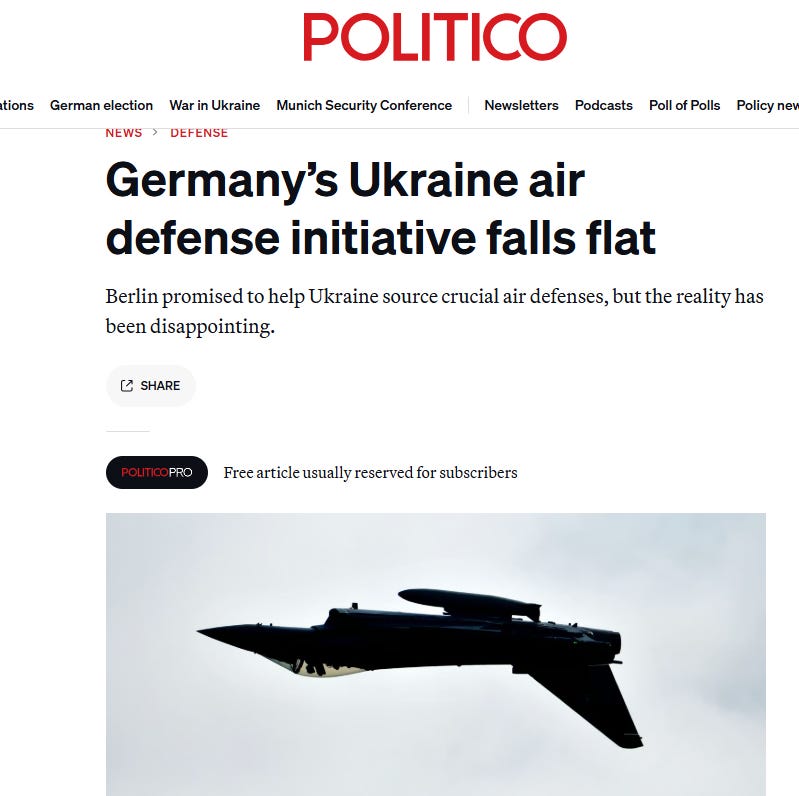Europe Isn’t Crumbling Under Trump’s Greed and Putin’s Games
Why Western Media Keep Getting Europe Wrong
As expected, Western media have wasted no time portraying Europe’s response as incoherent after leaders rushed to Paris for an urgent meeting on Ukraine—while Donald Trump looms in the background, threatening to leave them in the dark.
"The response was underwhelming," one major publication declared.
This is their standard approach to covering issues of critical importance—always finding a way to dial up the negativity. But let’s go back to mid 2024 and examine a revealing piece of evidence about their coverage of Ukraine.
On May 22, 2024, a major Western publication—one that is widely read within European political circles—reported on Germany’s efforts to bolster Ukraine’s air defenses. But the image they chose for the story speaks volumes about the message they intended to convey.
I called them out in strong terms after they published their story.
I agree—Germany faced significant roadblocks in its attempt to deliver long-range air-defense systems to Ukraine. At one point, it was the only country consistently sending them. Romania pledged a Patriot unit but never delivered. The Netherlands promised one in partnership with another country but kept searching for that partner. The United States recorded a unit in its books but never sent it. Italy was supposed to send a long-range SAMP-T system, but they never even started packing.
Only Germany said they would deliver—and they did. That was May 2024.
So the publication wasn’t entirely wrong in saying Ukraine wasn’t getting the air-defense systems it needed. But why claim Germany’s effort fell flat? They were just getting started. They were pushing hard, even if the immediate results weren’t there. But where is that story now?
By December 2024, Germany had met its target—delivering all five promised long-range air-defense units to Ukraine. Every single battery arrived. So where is the headline: "Germany’s Ukraine Air Defense Initiative Roars Back to Life"?
Nowhere.
All we got was the story about how it fell flat. And that’s exactly my issue with Western media: they frame the failure, then they move on. Who is supposed to tell readers that the systems were delivered? That Germany’s persistence paid off? That these air-defense units are making a difference on the battlefield?
Not a single Western outlet reported it.
I didn’t expect anything concrete to come out of the meeting Emmanuel Macron organized in Paris yesterday. I even laid out my reasoning in yesterday’s piece.
Europe, however, is moving in the right direction. Leaders are discussing the deployment of troops to Ukraine (a long-term solution) and a massive increase in aid (a short-term fix that allows Ukraine to say, “No thanks” to an unreliable Trump administration).
And things will improve even further once the German elections are over.
Expecting any concrete decisions before the German elections are over is naive. Even after the elections, it will take time before we get real answers. But the meeting itself was a positive signal—proof that things are moving in the right direction.
The power bloc of Europe has finally started shedding its obsession with consensus on everything—an unnecessary restraint that has long handcuffed the continent. If they waste time chasing full European consensus on how to assist Ukraine in the event that Trump throws them under the bus, the response will come too late—and likely end in failure.
Macron brought together Germany, Italy, Spain, Poland, Denmark, and the United Kingdom. Notably absent were Hungary’s Orbán and Slovakia’s Fico—the two Putinists inside the EU. Keeping the group small allows Europe to move faster and make sharper decisions.
But I do have one issue: they need to include the Baltic nations and Finland in their next meeting. Any decision to aid Ukraine must involve the United Kingdom, Germany, Italy, Spain, Poland, Denmark, Finland, Norway, Sweden, Estonia, Latvia, and Lithuania. Not only to help Ukraine in this critical hour but also to build a lasting structure to deter Putin in the future. The strategy should unite the bloc’s most powerful players with the countries that share a border with Russia. Together, they can defeat him.
Some might say this is setting the stage for the EU to break apart. That’s the wrong assumption. Europe must adapt to the realities it faces. The Putin-aligned actors inside the EU exist to block consensus—that’s their role. So there’s no point waiting for unity when action is needed. The only way forward is to form a smaller coalition within the EU—one made up of nations with the financial resources and those directly exposed to Russian threats. A mini-EU alliance that can push ahead without the dead weight.
Europe is finally adapting to the new reality—moving away from its paralysis of consensus and toward decisive action. The coalition Macron assembled in Paris is a step in the right direction, but it is not yet enough. The absence of the Baltic states and Finland is a gap that must be filled if Europe is serious about countering Putin in the long run.
That’s where Zelensky comes in.
If he directly urges Macron to expand the circle—and insists on it—Europe’s response will be far stronger. A coalition of powerful economies and frontline states, working outside the EU’s usual bureaucratic gridlock, could be the key to sustaining Ukraine and deterring future aggression.
This is how Europe wins. Not by waiting for everyone to agree, but by leading with those who are ready to act.






There is a ”Baltic group” within EU, consisting of Estonia, Latvia, Lithuania, Sweden, Finland, Denmark. Denmark is now chairing this group, Denmarks PM, Mette Fredriksen represented all of this group in the French talks. (I’m not sure about Norway in this case)
Now they must plan an action and act upon the plan...Immediately...